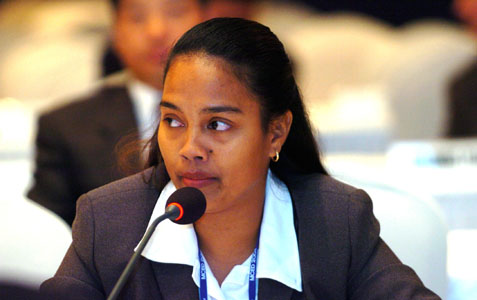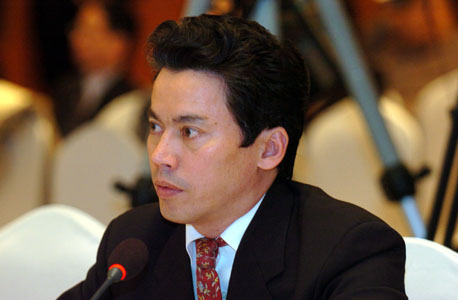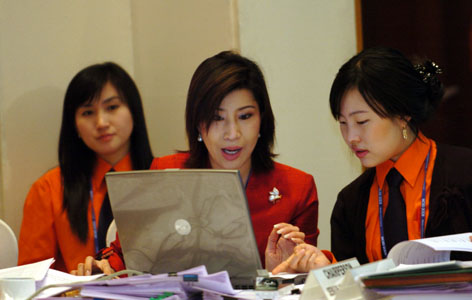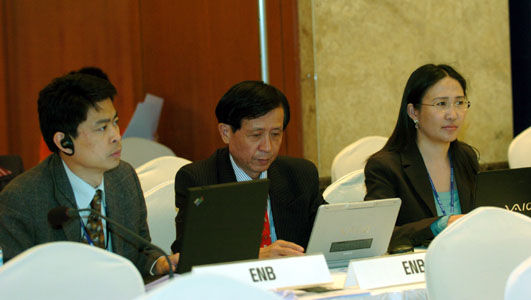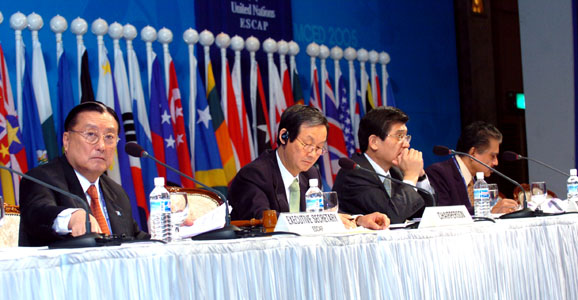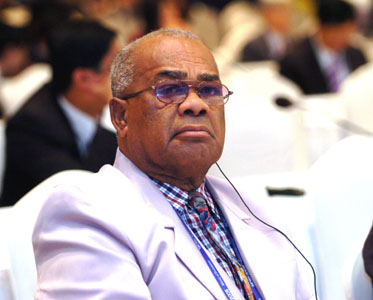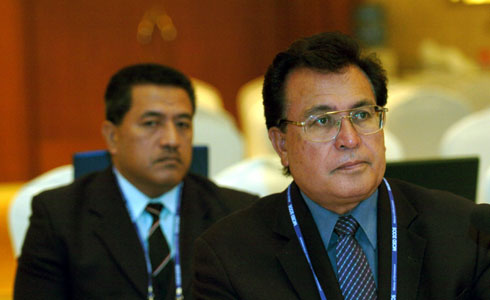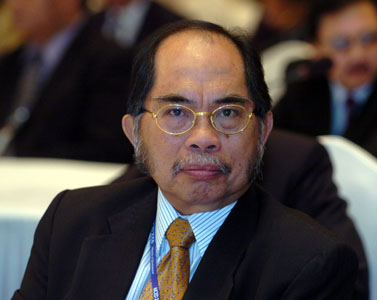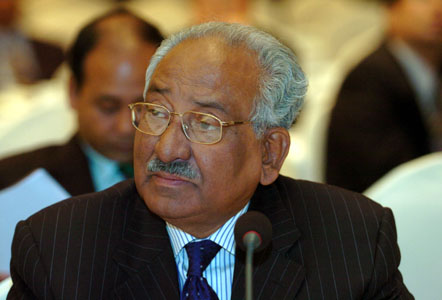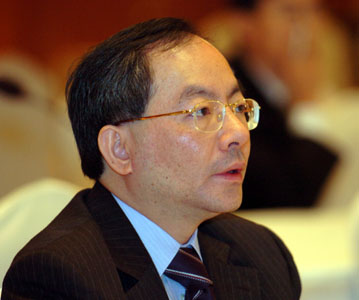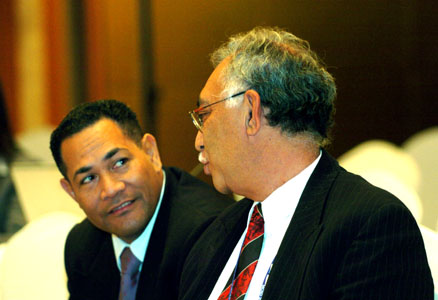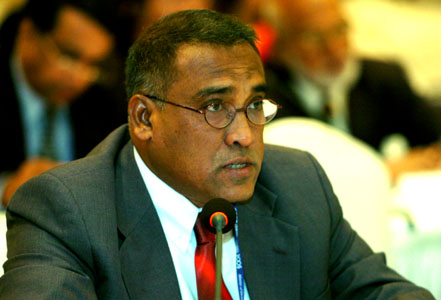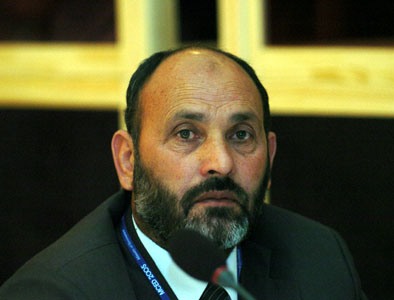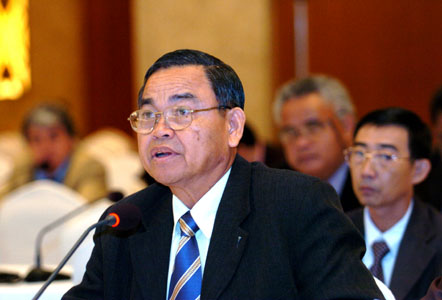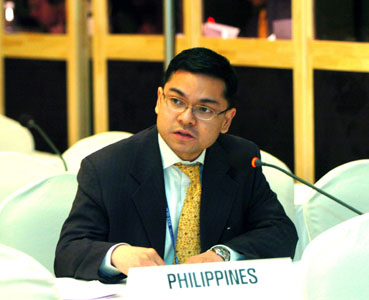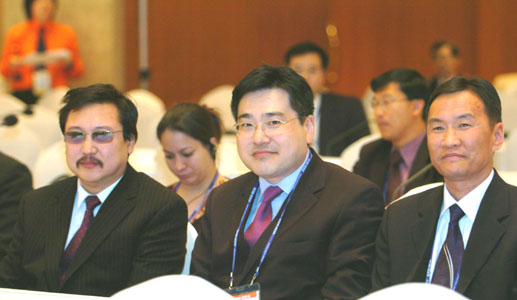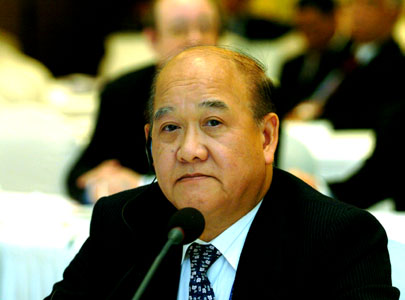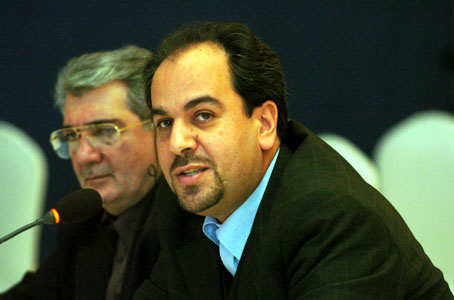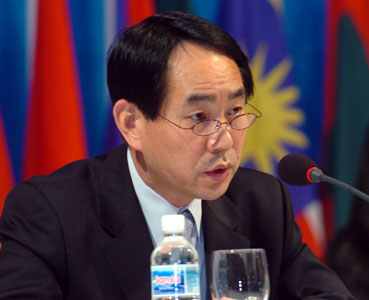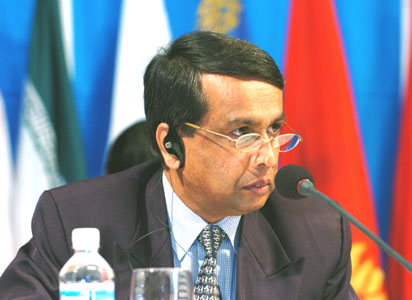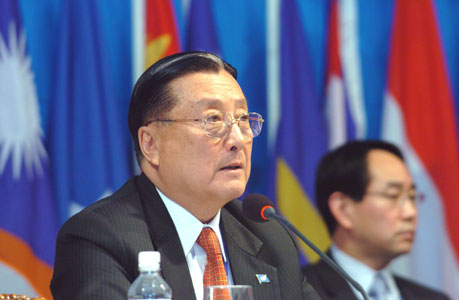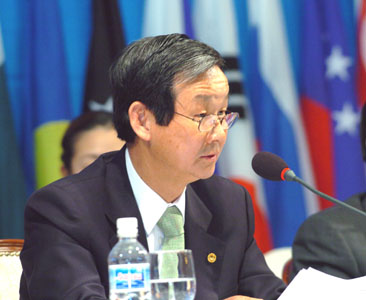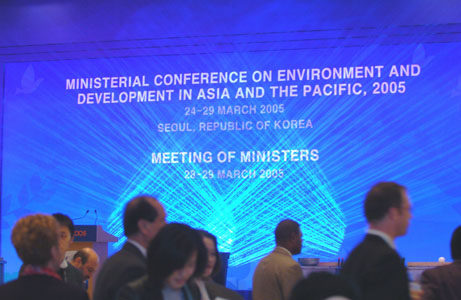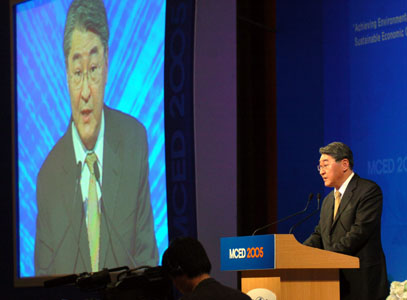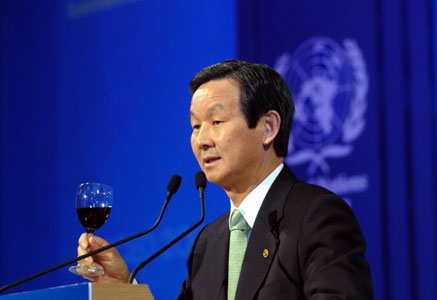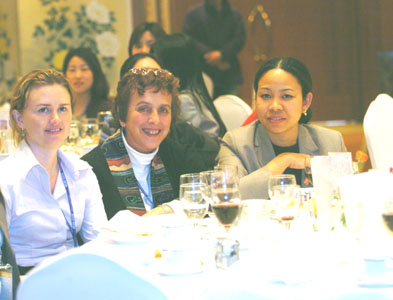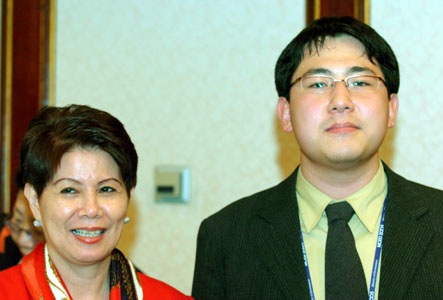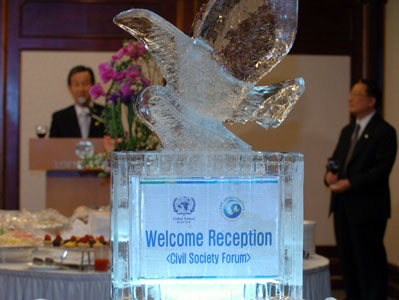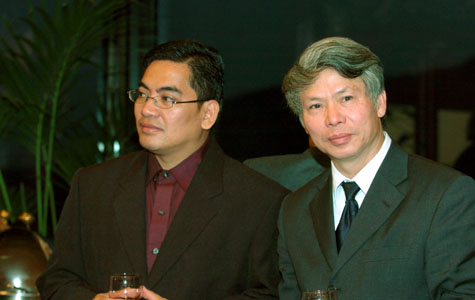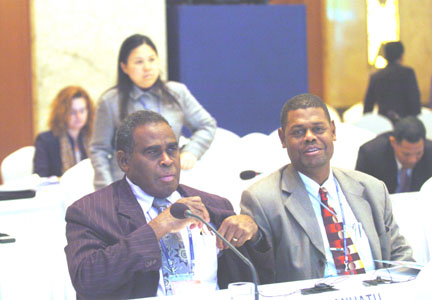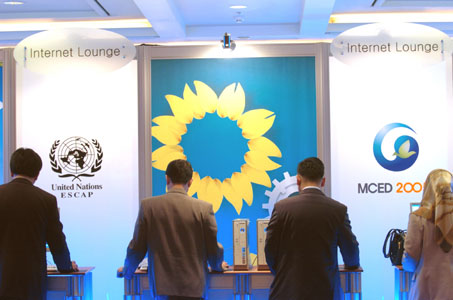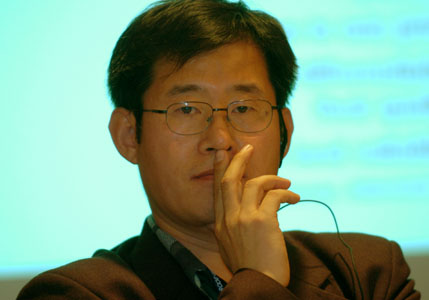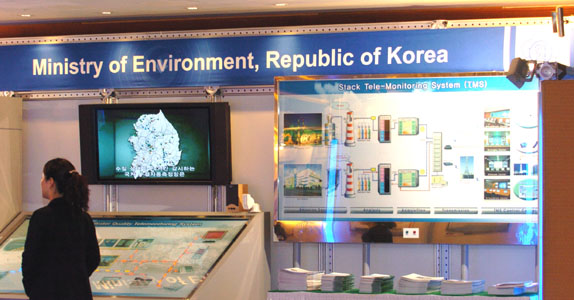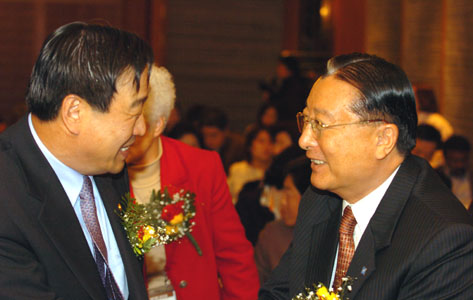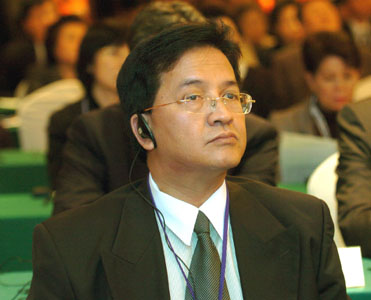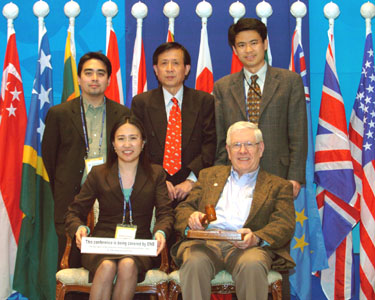|
|
|
|
|
|
|
Highlights for
Tuesday, 29 March 2005
|
|
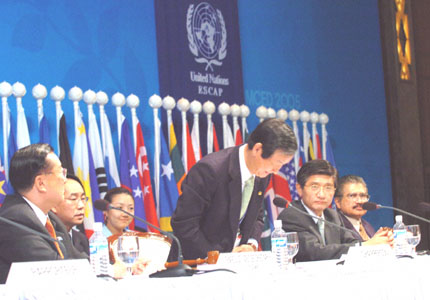
|
Delegates to the Meeting of Ministers of
the Fifth Ministerial Conference on Environment and Development
in Asia and the Pacific continued to meet in plenary on Tuesday
to: discuss policy perspectives in the region; consider the
report of the Preparatory Meeting of Senior Officials, the draft
ministerial declaration, the regional implementation plan, and
the Seoul Initiative; and adopt the report of the Conference.
Above photo: Chair Kyul-Ho Kwak takes a
customary bow during the closing session of MCED
2005
|
|
|
|
|
Above photos
L-R: Hak-Su
Kim, Executive Secretary of ESCAP and Kyul-Ho
Kwak, Korean Minister of Environment;
|
|
|
|
|
|
|
Above photos
L-R: Joji Banuve, Fiji; Sir Geoffrey
Henry, Cook Islands with Vaitoti Tupa in the
foreground, Pehin Dato Ahmad Haji Jumat, Brunei
Darussalam; Mohammad Saifur Rahman, Bangladesh
|
|
|
|
Policy
Perspectives in the Asian and Pacific Region:
BRUNEI DARUSSALAM and BANGLADESH endorsed the
regional implementation plan to be adopted at the
Conference, and called for its full
implementation. MALDIVES outlined its commitment
to sustainable development in the area of tourism,
and called for further commitment from donor
countries to climate change, which is affecting
the country severely. SRI LANKA urged countries in
the region to establish an early warning system to
combat natural disasters. MONGOLIA outlined
environmental problems that the country faces, in
particular dust and sandstorms, land degradation,
droughts, and natural disasters, and outlined its
green wall zone forestation project.
PAKISTAN
proposed launching a regional campaign for public
education on sustainable development, and called
for strengthening early warning systems and
increasing government investments for
environmental projects. MACAO, CHINA said the rapid
urbanization process has imposed pressure on the environment, and stressed the need for
an holistic
approach to strike a balance between environmental
protection and economic growth. NIUE called for
multilateral cooperation to protect marine
resources to avoid over-fishing and
over-exploitation. Noting that the priorities on
its national agenda include poverty reduction,
sustainable energy, and raising environmental
awareness, THAILAND briefed participants on its progress in
developing strategies for environmentally
sustainable economic growth. CAMBODIA highlighted
its comprehensive national programme on
sustainable use of natural resources, particularly
forest and marine resources, and stressed
balancing growth and equity.
Highlighting
its achievements in strengthening environmental
governance, AZERBAIJAN stressed subregional
cooperation for addressing transboundary
environmental concerns. PALAU said that her
country has adopted a number of environmental
policies, including, inter alia, a national strategy and action plan for sustainable
development and Marine Protection Act, and
stressed: strengthening traditional
use
of natural resources; integrating traditional
knowledge into science and technology; and
promoting international cooperation and
partnership. Noting that climate adaptation and
disaster management strategies are priorities for
its country, COOK ISLANDS said it strongly
supports subregional initiatives for sustainable
development. Stressing cross-cutting issues of
development policy, SAMOA said ensuring
implementation of regional initiatives should be a
priority. On behalf of Pacific Islands States, he
highlighted development of a subregional strategic
plan.
|
|
|
|
|
Above photos L-R: Long Man Ao, Macao,
China; David Poihega talking to Minister
Toke Talagi, Niue; Daniel Le Gargagasson,
France; and Alma Ridep-Morris, Palau |
|
|
|
AUSTRALIA
drew attention to outcomes of a policy case study
on promoting environmentally sustainable
agriculture, which highlight the importance of:
promoting eco-efficiency; establishing good
governance systems; allocating appropriate
resources; and ensuring that policy is based on
sound science and a market based approach. FIJI
highlighted its achievements in strengthening
national environmental policy and legislation and
stated that its government works closely in
partnership with local communities. He also
stressed strengthening regional cooperation and
partnership for sustainable development. ISLAMIC
REPUBLIC OF IRAN emphasized its achievements in
environmental protection such as the adoption of a
long-term water strategy and promotion of low
carbon energy systems. He also stressed the role
of private-public partnership in decoupling
economic growth and environmental degradation.
Noting that environmental considerations are
incorporated in all development schemes of his
country, TIMOR LESTE stressed the importance of
awareness raising and regional and subregional
cooperation for environment and development.
Stressing the role of small and medium-sized
enterprises (SME), the PHILIPPINES said
governments should ensure development of clean
production technologies for SMEs. He also
highlighted the importance of international
financial support in promoting sustainable
development in the region. VANUATU appealed to donor
countries to provide assistance for the full
implementation of the outcomes of the Conference.
KAZAKHSTAN outlined its national legislation on
waste management, and proposed establishing a new
international agreement on drinking water.
AFGHANISTAN outlined some of its geographical and
environmental features and recent trends of
environmental protection. LAO PEOPLE'S
DEMOCRATIC REPUBLIC drew attention to obstacles
facing the country, including institutional
capacity, limited access to technology and
finance, and called for international support in
this regard. UN Educational, Scientific and
Cultural Organization (UNESCO) said that
UNESCO's recent launching of the Decade of
Education for Sustainable Development will help to
solve environmental problems faced in the 21st
century. REGIONAL ENVIRONMENTAL CENTER FOR CENTRAL
ASIA highlighted regional and subregional
cooperation and urged for implementation of the
outcomes of the Conference.
|
|
|
|
|
|
Report of the
Preparatory Meeting of Senior Officials and
Consideration and Adoption of the Ministerial
Declaration, the Regional Implementation Plan for
Sustainable Development in Asia and the Pacific,
2006-2010, and the Seoul Initiative on Environmentally
Sustainable Economic Growth "Green Growth":
Young-Woo Park (Republic of Korea), Chairperson
of the Preparatory Meeting of Senior Officials that took
place prior to the Conference presented the report of the
meeting (E/ESCAP/MCED(05)/1), which includes three
annexes: the Ministerial Declaration, the Regional
Implementation Plan, and the Seoul Initiative.
FRANCE
emphasized the role of local communities in achieving
green growth by implementing Agenda 21 and providing
services to local people, and proposed establishing an
intergovernmental panel on early warning system. He
reiterated the French proposal of transforming UNEP into
a United Nations Environment Organization. REPUBLIC OF
KOREA appealed to countries in the region to actively
participate in the Seoul Initiative Network for Green
Growth.
Delegates adopted the report and its annexes without
amendments.
|
|
|
|
|
| Above photos
L-R: Young-Woo
Park (Republic of Korea), Chairperson of the
Preparatory Meeting of Senior Officials; Rapporteur W.R.M.S.
Wickramasinghe (Sri Lanka); Hak-Su Kim, Executive Secretary of
ESCAP; Chair Kyul-Ho Kwak |
|
|
|
|
Adoption
of the Report of the Conference: Rapporteur W.R.M.S.
Wickramasinghe (Sri Lanka) introduced the
report of the Conference (E/ESCAP/MCED(05)/Rep.).
On paragraphs relating to the relationship between
economic growth, poverty reduction and
environmental degradation, INDIA, supported by
MALAYSIA, proposed amendments highlighting: the
importance of simultaneously addressing
environmental protection and social development
where economic growth is a prerequisite to reduce
poverty; and stressing that green growth
approaches should balance the three pillars of
sustainable development. MALAYSIA proposed
highlighting the severity and consequences of the
recent tsunami and other natural disasters in the
region. Delegates adopted the report of the
Conference with these amendments.
Closing
Session: Hak-Su Kim, Executive Secretary of
ESCAP, delivered a closing statement. He commended
delegations' commitment and enthusiasm in
promoting environmentally sustainable economic
growth, and said the main messages of the
Conference stress the need to: move away from
business as usual policies; convert environmental
challenges into opportunities; and engage
stakeholders in the pursuit of green growth. He also said the Conference has paved the
way towards sustainable development in the region.
In his closing remarks, Chair Kyul-Ho
Kwak highlighted the important outcomes of the
Conference: the Ministerial Declaration on
Environment and Development; the Regional
Implementation Plan; and the Seoul Initiative.
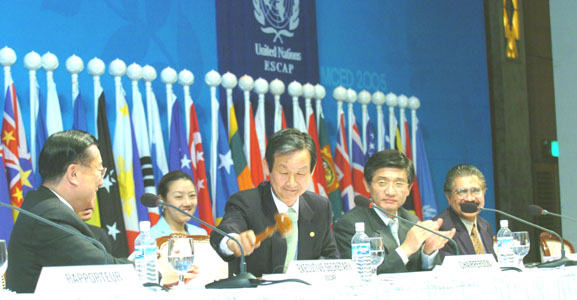
Chair Kyul-Ho Kwak gaveled the meeting to a
close at
5:15 pm.
|
|
|
|

|
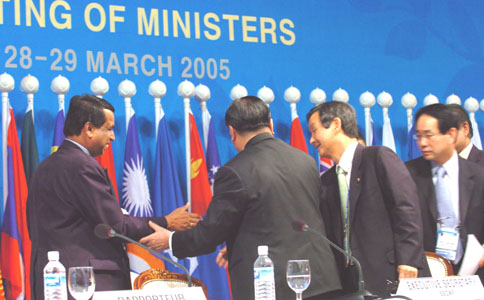
|
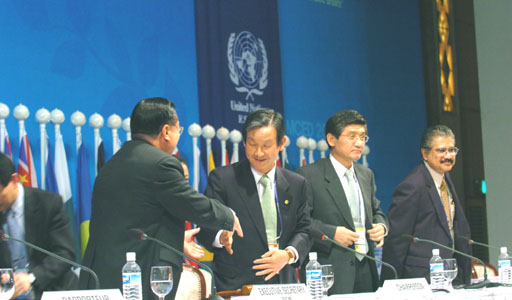 |
|
Above photos: Chair Kyul-Ho Kwak takes a
customary bow; Chair Kyul-Ho Kwak being
congratulated for the successful conclusion of
MCED 2005.
|
|
|
MCED
2005 CONFERENCE SNAPSHOTS:
|
|
|
|
|
|
|
|
|
MCED ENB 2005
TEAM:
|
|
| Above
photos: MCED ENB 2005 TEAM Franz Dejon, Kunbao Xia,
Changbo Bai, Sarantuyaa Zandaryaa, and William
McPherson; ENB in action (speed typing at 200 wpm) |
|
 |
Related Links |
 |
|
|
